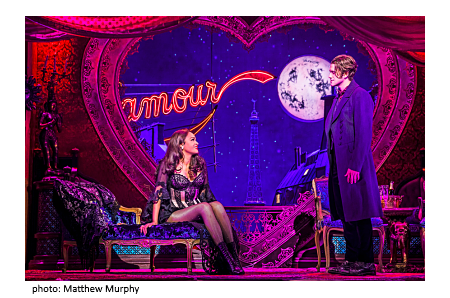


It’s erotic and flashy. Baz Luhrmann’s 2001 movie about the decadence of Belle Époque Paris has been restaged as a Broadway musical. Now at the Al Hirschfield, Moulin Rouge!’s set design boasts the nightclub’s classic windmill, red-on-red décor and the ever-present Parisian views. A giant L’amour neon backdrop underscores the theme: the tragedy of mismatched lovers.
Penniless songwriter Christian (Aaron Tveit) discovers courtesan-singer Satine (Karen Olivo), and although they click, she’s practical. Desired by the dangerous Duke of Monroth (Tam Mutu), love is a commodity she cannot afford. The Duke may be a monster, but he can transform her hard life into a luxurious existence.
Impresario (Danny Burstein) pushes the union to save the nightclub, while Christian sustains their torrid affair. The Montmartre demimonde painter Toulouse-Lautrec (Sahr Ngaujah) and tango dancer Santiago (Ricky Rojas) are guides to an erotic world of art and desire. Moulin Rouge!, a mash-up of 70 pop hits spanning decades, is a jukebox musical with a sexy twist.
Colorful costumes by Catherine Zuber whirl through Sonya Tayeh’s sassy choreography as Derek McLane’s flamboyant sets augment the decadence. Tveit and Burstein are particularly well cast.
However, Olivio, who won the Tony for West Side Story, is more fierce than flirtatious for a nuanced courtesan. Yet under Alex Timbers’ direction, Moulin Rouge! marries a bit of La Boheme and a dab of “Lady Marmalade” to concoct a surface, but beguiling production.
Anyone who has seen Chekhov’s Three Sisters knows it’s a tale of unfulfilled desire. Olga, Masha and Irina bitterly complain about the Russian backwater they’re stuck in, longing to return to the glories of Moscow. For anyone who has wanted to scream “just go!” from the audience, playwright Halley Feiffer provides a snarky revamp.
Moscow Moscow Moscow Moscow Moscow, now at the MCC Theater’s new, intimate Off Broadway space, gives the classic a decidedly 21st-century twist. It’s still Chekhov, but played with a send-up of turn-of-the-last century theatrical styles. While it appreciates Sisters’ stature, it is also funny and irreverent, zinging Chekhov’s portrayal of provincial 1901 Russia. (Those familiar with the original will appreciate more of the zingers, such as Olga’s complaint: “I get confused with all the names.”) The story is intact; it’s the execution that differs.
Olga (Rebecca Henderson) bemoans her state and what she perceives as her ugly demeanor. Masha (a cross-dressing Chris Perfetti) is married to a man she despises, but entranced by handsome Vershinin (Alfredo Narciso). And beautiful Irina (Tavi Gevinson) longs for true love, but is courted by Tuzenbach (Steven Boyer), a good friend she knows is gay, but who proposes, endlessly, anyway. All, ultimately, are at the mercy of Andrey (Greg Hildreth), their weak brother, and Natasha (Sas Goldberg), his nightmarish wife. It’s a bit like Chekhov on steroids: Everything is pushed to its extreme, aided by Trip Cullman’s lively direction.
Mark Wendland's set design is defined by the Russian word Mochba (Moscow) spelled out in light bulbs, accompanied by a large, colorful drawing of the city. Ben Stanton’s lighting is notable, as are Paloma Young’s modern costumes, with a hint of period Russia. And though Feiffer throws in a millennial sensibility and flippantly reconstructionist ending, it doesn’t really change the play’s essence. All the sadness and irony remain.
However striking the profanity and snarkiness, it is still Chekhov who elicits the humanity and despair. — Fern Siegel